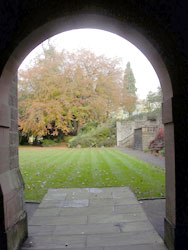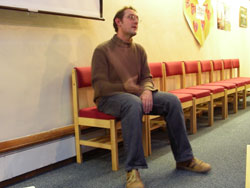The story is told of hungry and weary travelers who were refused hospitality by townspeople who wanted to keep what little they had for themselves. The travelers eventually borrowed a large pot and began to make soup with what was available—stones and water. When it was done they promised to share it with the whole village!
As the soup simmered, they “oohed” and “ahhed” over their creation. The curious townspeople looked on, and someone eventually offered to add a carrot or two, some potatoes, salt and pepper, and so on.
God is making stone soup and we’ve been invited to add our Anabaptist flavoring to the pot.
In January 2001 a then relatively unknown man named Brian McLaren challenged a gathering of Franconia Conference pastors and leaders to add our seasoning. In fact, according to my notes, he said that he thought Mennonites were 500 years ahead of time… that our Mennonite heritage has something important to offer the world in the dawning post modern era.
McLaren probably wasn’t the first person to say something like this, but recently I have heard the invitations growing in number and urgency.
In June Greg Boyd, pastor of the St. Paul, Minnesota, mega church, Woodland Hills, gave the key-note address at the gathering of Mennonite Church USA boards in Columbus, Ohio. Boyd is on a journey. In the 1990s he became increasingly uncomfortable with the direction of mainstream evangelicals. By 2004 he could no longer tolerate the pressure of the evangelicals to endorse political candidates based on narrowly defined issues. He preached a six part sermon on the cross and the sword and 700 people left his church. In case they didn’t quite “get it,” he preached further on this theme and another 300 left—a full 20% of his congregation!
The New York Times ran a front-page story about this which was picked up by a whole variety of papers, and eventually he was invited to participate with Mennonites in a conference at Hesston College in October 2007. Boyd came away from that encounter declaring, “It turns out I’m a Mennonite!”.
In his June 2008 presentation to the Mennonite Church USA boards, Boyd offered four specific words:
- Cherish the treasure that you have! The Anabaptist heritage is centered on the Kingdom of God, it is clear, Christ-looking and utterly unique. All over the globe people are opening up to the understanding that being a Christian is about imitating Christ. But here’s what they don’t have—postmodern people don’t like the modernist idea that history begins with them—they want a rooting in history. And just when the world is running toward an Anabaptist vision, many Anabaptists are running from it.
- Be utterly inflexible when it comes to the core principles of the Kingdom and become increasingly flexible to culture. In an attempt to modify our culture, don’t modify your understanding of the Kingdom. Hold fast to a theology of simplicity, non-violence, service, and self-sacrifice but be completely flexible on everything else.
- The time has come for the vision entrusted to the Anabaptists! We can offer a tribe, history, and a sense of belonging to those who are coming to our understanding of the Kingdom of God. “Get your house in order—the world is running to you … it’s not a pride thing, it’s a Kingdom thing!” Embrace the center; let go of the periphery.
- Whatever you do, attain Kingdom ends by Kingdom means! Do whatever we do not just “for the Kingdom” but “as the Kingdom.” Bring the Kingdom down into our midst through love and prayer. Keep God’s interests before your own interests.
And there are other voices around the globe echoing very similar things!
So how shall we respond? Will we continue to be the humble, quiet in the land? Or has God given us a treasure for the world whose time has come? And if the latter, how do we begin to open ourselves to offer a tribe and place to people who are discovering and embracing Anabaptist theology? How do we own it ourselves? How do we learn to be comfortable in our own skin rather than conforming to the culture around us?
Perhaps it’s more powerful to let others discover us and speak for us. Yet they wonder why we make it so hard for them to find us. They wonder if we really want them to find us, and they wonder why some of us are running away from our own theology just when they are finding it and looking to join a tribe of people who have tried to faithfully live it out for 500 plus years.
I have a large pot, some stones, and water. What’s in your garden? Together perhaps we can make something amazing and delicious … and we can invite others to join us for a feast!

 At some point, however, I begin to wonder when they will be mature enough to feed themselves. Even when they appear the same size as their parents, they hop behind their parents, loudly chirping, “Feed me! Feed me!” They appear big enough to get their own food, which is right at their feet, yet they expect their parents to drop the food into their gaping mouths.
At some point, however, I begin to wonder when they will be mature enough to feed themselves. Even when they appear the same size as their parents, they hop behind their parents, loudly chirping, “Feed me! Feed me!” They appear big enough to get their own food, which is right at their feet, yet they expect their parents to drop the food into their gaping mouths. For some months now I have been thinking about this question—with a growing sense of urgency for what it means for our future as congregations, as a conference, and as a denomination.
For some months now I have been thinking about this question—with a growing sense of urgency for what it means for our future as congregations, as a conference, and as a denomination. Evangelists: In Matthew 28, Jesus commissioned his disciples to share the Good News! Who of us can deny that as a commission that transcends the ages? For too long we have muzzled the Good News. Being commissioned is more than, “do it if it’s convenient or if you feel like it.†A commission is to be taken seriously. Our FMC history is littered with evangelists who could not find a place among us. They have gone out from us to found churches like Calvary Church of Souderton, BranchCreek Community Church, Living Faith, and more. The Kingdom is still blessed by their gifts, but how can we make space—and even embrace—evangelists to use their God-given gifts among us? What drives them out from us?
Evangelists: In Matthew 28, Jesus commissioned his disciples to share the Good News! Who of us can deny that as a commission that transcends the ages? For too long we have muzzled the Good News. Being commissioned is more than, “do it if it’s convenient or if you feel like it.†A commission is to be taken seriously. Our FMC history is littered with evangelists who could not find a place among us. They have gone out from us to found churches like Calvary Church of Souderton, BranchCreek Community Church, Living Faith, and more. The Kingdom is still blessed by their gifts, but how can we make space—and even embrace—evangelists to use their God-given gifts among us? What drives them out from us? I feel profoundly blessed. God is stirring the waters around the world, and I have had the privilege to witness some of this stirring. Here I share a brief glimpse of my recent God-sighting in the U.K.
I feel profoundly blessed. God is stirring the waters around the world, and I have had the privilege to witness some of this stirring. Here I share a brief glimpse of my recent God-sighting in the U.K. What I heard: In brief, I heard people embracing Anabaptism because they understand that to be an Anabaptist means that you are someone who sees Jesus as your example, teacher, friend, redeemer, and Lord; that Jesus is the focal point of God’s revelation; that western culture is slowly emerging from the Christendom era; that the frequent association of the church with status, wealth and force is inappropriate; that churches are called to be committed communities of discipleship and mission; that spirituality and economics are inter-connected; and that peace is at the very heart of the gospel (www.anabaptistnetwork.com/coreconvictions). I saw them building networks of like-minded people with the goal of complementing rather than competing with one another’s ministries.
What I heard: In brief, I heard people embracing Anabaptism because they understand that to be an Anabaptist means that you are someone who sees Jesus as your example, teacher, friend, redeemer, and Lord; that Jesus is the focal point of God’s revelation; that western culture is slowly emerging from the Christendom era; that the frequent association of the church with status, wealth and force is inappropriate; that churches are called to be committed communities of discipleship and mission; that spirituality and economics are inter-connected; and that peace is at the very heart of the gospel (www.anabaptistnetwork.com/coreconvictions). I saw them building networks of like-minded people with the goal of complementing rather than competing with one another’s ministries. I think there’s much we can learn from our sisters and brothers in the U.K. as we enter a new era in the U.S., and I’m delighted to learn that they would like to keep the conversation going too.
I think there’s much we can learn from our sisters and brothers in the U.K. as we enter a new era in the U.S., and I’m delighted to learn that they would like to keep the conversation going too.